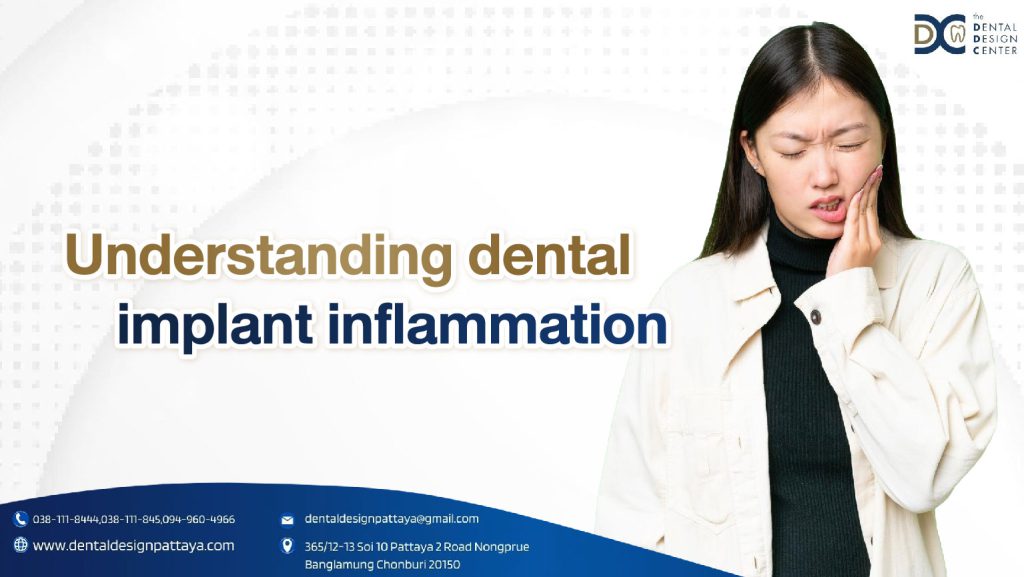Dental implants are a treatment option that involves removing a natural tooth root and replacing it with an artificial root. This is done to replace a missing tooth. However, after dental implant surgery, a common complication is dental implant inflammation, which can be caused by various factors. In this article, we will explore the causes of dental implant inflammation and how to care for your dental implants.
What are the symptoms of dental implant inflammation?

Dental implant inflammation is an infection of the surgically placed implant. Typically, symptoms of dental implant inflammation occur within 1-3 months after the implant procedure. Patients should therefore be vigilant and observe whether they experience any of the following symptoms that may indicate a risk of dental implant inflammation.
Pain, swelling, and redness of the dental implant
This is the most common issue encountered after dental implant surgery. Typically, the pain, swelling, and redness associated with dental implants are less severe than natural tooth pain. However, the intensity of these symptoms can vary from person to person. Some individuals may experience such severe discomfort that they cannot tolerate it and require immediate treatment.
Pus discharge from the dental implant
Pus is a sign of infection. If pus or cloudy fluid is discharging from the dental implant, it should not be ignored or self-treated. This could lead to a more severe infection and increase the risk of other dental implant-related diseases.
Loosening or instability of the dental implant
The cause of a loose dental implant is often severe infection. The infection can damage the jawbone that supports the implant, compromising the bond between the implant and the jawbone, resulting in implant instability.
Therefore, if patients notice any of the above symptoms or any abnormalities with their dental implants, they should seek immediate medical attention. This is crucial for proper treatment and prevention of the risk of dental implant inflammation.
What Causes Dental Implant Inflammation?
Dental implant inflammation is a common issue faced by individuals who have undergone dental implant surgery. The causes of dental implant inflammation can be attributed to both the patient and the dental professional. Lack of expertise on the part of the dentist can contribute to dental implant inflammation.
1. Infection
Dental implant infections can occur at various stages of treatment. Substandard treatment or surgical procedures can lead to infections. Additionally, patients who fail to follow post-operative care instructions may also develop infections.
2. Poor Surgical Technique
This issue can arise from dentists lacking expertise or experience. If a dentist is not specialized in dental implant procedures, they may use incorrect surgical techniques. Additionally, insufficient cleanliness and safety measures can lead to implant infections. Therefore, before undergoing dental implant treatment, patients should always consider the credibility and expertise of both the clinic and the attending dentist to prevent risks and severe complications.
For those experiencing dental implant issues or seeking dental consultation, dental clinic Pattaya is an excellent option. If interested, you can inquire about dental treatments at Dental Design Center, as we offer a full range of dental services to address all oral and dental health concerns for people of all ages and groups. If you need to consult about specific dental problems requiring treatment, you can contact the clinic directly through their website or call 094-960-4966.
3. Trauma to the Dental Implant
In the initial stages following dental implant surgery, patients should avoid consuming hard foods or using the newly placed implant for biting into hard or tough substances. During this period, the dental implant is not fully integrated into the jawbone and is more susceptible to damage. Severe trauma to the implant can cause it to become loose and increase the risk of mouth infection.
4. Insufficient or weak bone structure
Typically, this is the least common cause, as dentists always examine and evaluate patients before performing dental implant procedures. If a patient has weak or insufficient bone structure for a dental implant, the dentist will perform a bone graft first to prevent subsequent problems.
5. Failure to follow dentist’s instructions
Neglecting or not following the dentist’s instructions increases the risk of dental implant complications and other issues. After the dental implant procedure is completed, patients must take proper care of their implants and maintain adequate hygiene to extend the lifespan of the dental implants.
How to Prevent Dental Implant Inflammation

Preventing dental implant inflammation involves post-surgical care so that patients can easily do themselves through various methods. These include regular brushing and flossing to clean food particles stuck in the mouth, as well as avoiding risks that may lead to dental implant inflammation. For example, patients should refrain from smoking and avoid consuming hard or sticky foods, as these behaviors can severely damage dental implants and lead to inflammation. Additionally, one crucial step patients must take after surgery is to strictly follow the dentist’s instructions.
Treating Dental Implant Inflammation
The easiest and most effective method for treating dental implant inflammation is to visit the dentist who performed the procedure or a specialist. Dental implant inflammation is a severe problem that patients cannot manage or treat on their own. Therefore, it is necessary to see a dentist as soon as possible when abnormal symptoms of the dental implant occur. In some severe cases of dental implant inflammation, surgery may be required.
Conclusion
Dental implant inflammation is a serious dental complication caused by bacterial infection, poor oral hygiene, or improper treatment. It results in abnormalities around the dental implant. Therefore, it is crucial to consult a dental specialist for diagnosis and appropriate treatment of dental implant inflammation.

